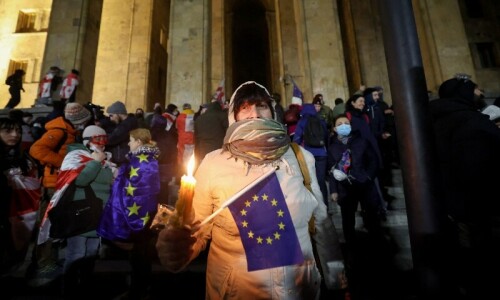We have more of an informal economy than a formal one as is indicated by a low tax-to-GDP ratio, the size of the non-documented business activities and the under-served sectors by the banking system.
In other words, we have more of a cash economy .Normally small businesses do not avail of the services of the banking sector. The rural areas are under-served by the banks. These indicate aspects of under –development of the economy.
A low literacy rate is also a hurdle in opening of bank accounts. To make matter worse, the massive capital and financial inflows particularly the $6 billion remittances has obviated the need for the banks to seek deposits.
This has not encouraged banking among the teeming millions. Banks are also shy of lending to small enterprises. Lending could help enterprises in the informal sector in documentation of their businesses.
Of course, businesses operating in the formal sector have succeeded in evading taxes because of the inefficiency and corruption among the officials of the tax collecting agencies. The farmers do not pay income tax although the share of agricultural sector is close to 21 per cent of the national income. If the withholding taxes are excluded, the direct taxes have remained constant at around 20 per cent of the GDP. The direct tax has not risen in proportion to the incomes generated by a recent 6-7 per cent economic growth.
Now the government has come out with a tax amnesty scheme under which the black money can be converted into white money/assets.
Since the people have not been paying income tax, the government continues to increase the rate of sales tax, raised to 16 per cent in this year’s budget. The result is massive evasion of sales tax by a strong section of the businessmen who also claim vast refunds offered in collusion with the taxation officers.
If the commercial transactions were rooted through the banks there are better chances of tax collection, but only a part of the commercial transaction takes place through banks.
Now to make cash transactions easy, we have Rs5000 notes, apart from the Rs1,000 notes.
When asked what per cent of the informal sector borrowed money from the banks, Mr Ashraf Junjua, a former deputy governor of the Bank of Pakistan told a Management Association seminar, “not more than five per cent”. Such loans are for short periods and do not entail detailed documentation which suits the semi- literate traders.
The liberal exchange rate policies have also created a pool of money that is used for cross-border transactions, resulting on inflow and outflow of funds, depending on the economic and political health of the country. Now there is so much speculation that billion of dollars have moved to Dubai by businessmen in search of greener pasture. Similarly, tax officials suspect that remittances include financial inflows made by some of those engaged in foreign trade.
















































Dear visitor, the comments section is undergoing an overhaul and will return soon.